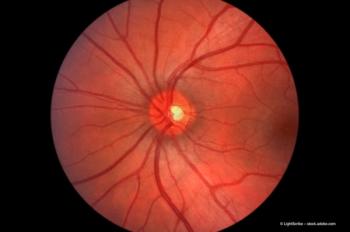
Noninfectious uveitis, uveitic macular oedema: A synopsis of frontline therapies
Dr Steven Yeh provides a brief overview of available therapies for noninfectious uveitis and uveitis macular oedema.
In Fort Lauderdale, Florida, Dr Steven Yeh, dives into his presentation, “Front-line therapies and novel drug delivery for uveitis.” He outlines a few common therapies, such as methotrexate, mycophenolate mofetil (CellCept; Genentech), adalimumab, and fluocinolone acetonide via suprachoroidal delivery (Xipere; Bausch + Lomb).
Video transcript
I have the privilege, at the Retina World Congress, to speak to frontline therapies and novel drug delivery for the treatment of noninfectious uveitis. Within the field of uveitis, we're very excited about the different possibilities and the therapeutic alternatives in our armamentarium — both systemic therapies that have been shown through randomized controlled studies to be effective for the treatment of noninfectious uveitis. These include medications like methotrexate as well as mycophenolate mofetil, or CellCept, for the treatment of steroid-sparing agents for noninfectious uveitis. We also have level-one data related to adalimumab, which is a tumor necrosis factor alpha inhibitor, that's also helpful for the treatment of noninfectious uveitis.
Now, when we think about uveitic macular oedema, which is the leading cause of vision loss in uveitis, we also know this is very important to target these as well, both from the standpoint of reducing complications related to structural deficits as well as improving visual acuity.
And there have been other randomized controlled studies that have also looked at both intravitreal therapies as well as suprachoroidal drug delivery for the treatment of noninfectious uveitis. Within the realm of intravitreal therapies, the fluocinolone acetonide 0.18 milligram dose has been shown to be effective for reducing the rate of recurrences of uveitis in randomized controlled studies and two large phase 3 studies.
Now with regards to other treatments in uveitis, suprachoroidal drug delivery is a nuanced innovative drug-delivery platform that allows the treatment of macular oedema due to noninfectious uveitis. Xipere, which is administered via the suprachoroidal drug-delivery platform, delivers high levels of medication within the retina to the choroid for reducing levels to anterior segment structures. Within the PEACHTREE study, which evaluated suprachoroidal drug delivery compared to sham control, patients who received Xipere experienced a greater visual acuity gain with about 47% of individuals getting three lines or greater visual acuity over the 24-week endpoint. In addition, rates of cataract were comparable between sham control, as well as suprachoroidal drug delivery and intraocular pressure rates were favorable as well.
So, in summary, there's a lot to be excited about within the realm of treatment for noninfectious uveitis both within systemic therapies, we have randomized controlled studies with level-one evidence about their efficacy signals for the quality of life and the patient's visual acuity with noninfectious uveitis. And within the realm of local therapies, both intravitreal and via the superchoroidal route, there's a lot to look forward to with regards to drug delivery to improve visual acuity and the quality life of our patients.
Note: This transcript has been lightly edited for clarity.
Newsletter
Get the essential updates shaping the future of pharma manufacturing and compliance—subscribe today to Pharmaceutical Technology and never miss a breakthrough.




























